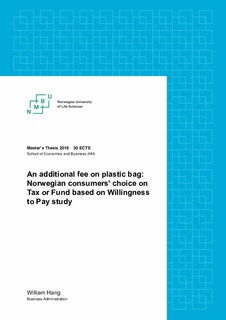| dc.contributor.advisor | Alfnes, Frode | |
| dc.contributor.advisor | Viciunaite, Viktorija | |
| dc.contributor.author | William, Hang | |
| dc.coverage.spatial | Norway | nb_NO |
| dc.date.accessioned | 2018-10-23T08:48:10Z | |
| dc.date.available | 2018-10-23T08:48:10Z | |
| dc.date.issued | 2018 | |
| dc.identifier.uri | http://hdl.handle.net/11250/2569068 | |
| dc.description.abstract | Plastic bag and its litter has become a painful issue for governments around the world (Hopewell et al. 2009). Several policies are applied to reduce the consumption of the residents, in which, few has shown remarkable improvement. In 2015, the European parliament and the council of the European Union amended the Directive 94/62/EC to make sure that all its member countries reduce the household consumption of plastic bag. Norway, as a part of European Economic Area (EEA) is obligated to follow the Directive. From then, two plans to achieve the goal have proposed to Norwegian government. While the method is similar by focusing on putting an additional fee on every plastic bag consumed, the purposes of how the money collected is used differs in directions – Norwegian Environment Agency supports Tax and Trade Association supports Environmental Fund. Thus, the purpose of this master thesis is to bring forward knowledge about the effect on consumer behaviour of a price increase on plastic bag, and whether is matters if the price increase comes in the form of a tax to the government or donations to an environmental fund. To investigate this issue, the author have conduct a review of academic research as well as international cases. Furthermore, I have conducted and analysed a quantitative survey with Norwegian consumers willingness to pay on plastic bag, including a split sample experiment on increased plastic bag prices. | nb_NO |
| dc.description.abstract | Plastpose og forsøpling har blitt et smertefullt problem for regjeringer over hele verden (Hopewell et al. 2009). Flere miljøtiltak brukes for å redusere forbruket til beboerne, hvor få har vist en bemerkelsesverdig forbedring. I 2015 har Europa-parlamentet og Rådet for Den europeiske union vedtatt endring av Direktivet 94/62/EF for å sikre at alle medlemsstatene reduserer husholdningenes forbruk av plastposer. Norge, som en del av Det europeiske økonomiske samarbeidsområdet (EØS), er forpliktet til å følge direktivet. Fra da, har to miljøtiltak for å nå målet blitt foreslått til den norske regjerningen. Selv om metoden er lik ved å fokusere på å legge til en ekstra avgift på hver plastpose som forbrukes, er formålene med hvordan pengene samles brukt, er i forskjellig retninger – ‘Miljødirektoratet støtter regjering- og Handelsnæringen støtter miljøfond. Formålet med denne masteroppgaven er således å gi kunnskap om effekten av forbrukeradferd på prisøkning på plastposer, og om det er viktig om prisøkningen kommer i form av skatt til staten eller donasjoner til en miljømessig fond. For å undersøke dette problemet har forfatteren gjennomgått en gjennomgang av faglig forskning og internasjonale saker. Videre har jeg gjennomført og analysert en kvantitativ undersøkelse hos norske forbrukere betalingsvillighet på plastpose, inkludert et delteksperiment på prisøkning på plastposer. | nb_NO |
| dc.language.iso | eng | nb_NO |
| dc.publisher | Norwegian University of Life Sciences, Ås | nb_NO |
| dc.rights | Attribution-NonCommercial-NoDerivatives 4.0 Internasjonal | * |
| dc.rights | Attribution-NonCommercial-NoDerivatives 4.0 Internasjonal | * |
| dc.rights.uri | http://creativecommons.org/licenses/by-nc-nd/4.0/deed.no | * |
| dc.rights.uri | http://creativecommons.org/licenses/by-nc-nd/4.0/deed.no | * |
| dc.subject | WTP | nb_NO |
| dc.title | An additional fee on plastic bag: Norwegian consumers' choice on tax or fund based on willingness to pay study | nb_NO |
| dc.type | Master thesis | nb_NO |
| dc.source.pagenumber | 52 | nb_NO |
| dc.description.localcode | M-ØA | nb_NO |

